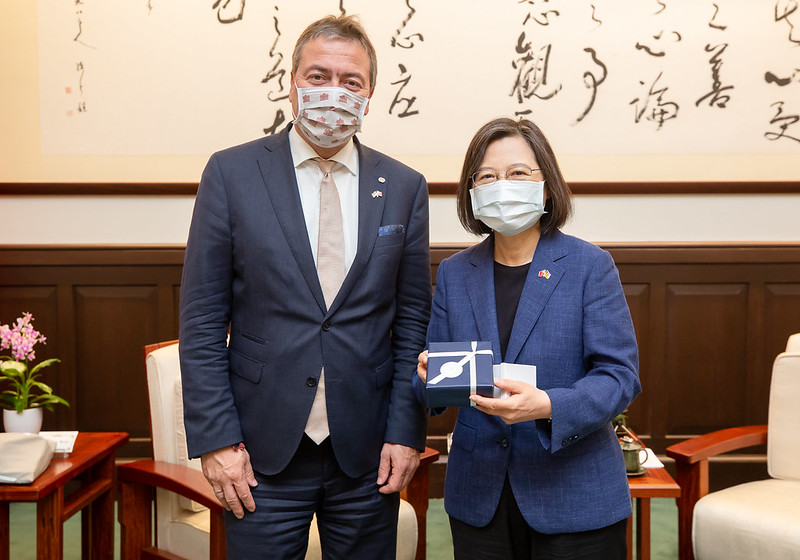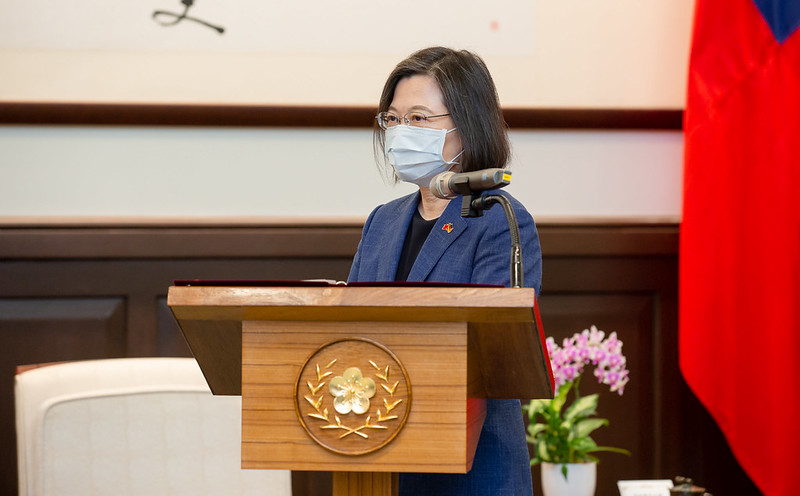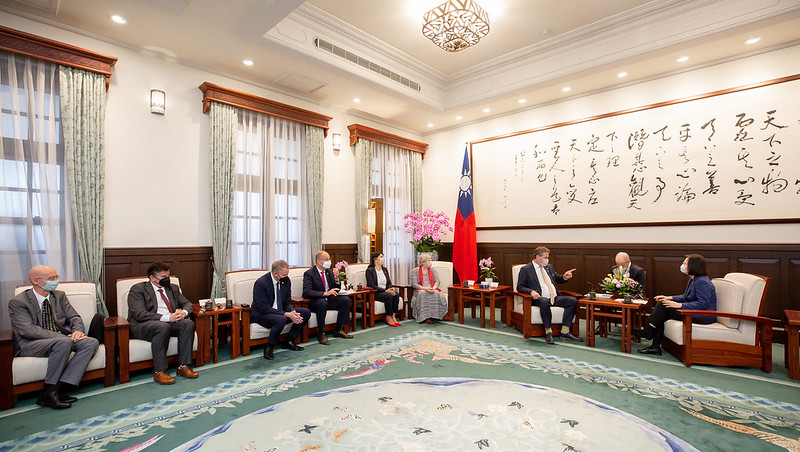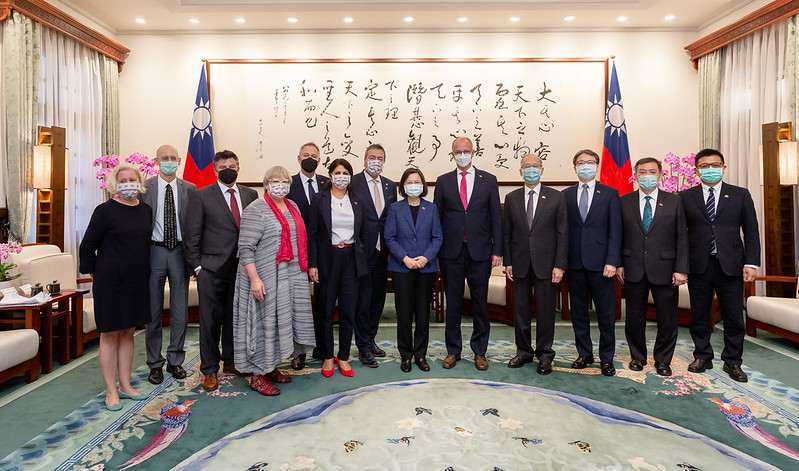News & activities
 News releases
News releases
On the morning of October 24, President Tsai Ing-wen met with a delegation from the Committee on Human Rights and Humanitarian Aid of the German Bundestag (national parliament). In remarks, President Tsai thanked Germany for supporting Taiwan on the international stage, and stated that, although we are not a member of the United Nations, Taiwan has nevertheless taken the initiative to set up a national human rights report review system, and has established the National Human Rights Commission as an independent human rights agency in line with the UN's Paris Principles. Noting that the commission is facilitating the adoption of human rights concepts in Taiwan and moving Taiwan toward the ideal of a nation founded on human rights, the president expressed hope that the members of the delegation will share with the global community Taiwan's efforts to align with international human rights standards and the great importance we attach to democracy, freedom, and human rights.
A translation of President Tsai's remarks follows:
I want to first welcome Member of the German Bundestag Peter Heidt and his delegation to Taiwan. The delegation includes members of parliament from across party lines, which is very significant and demonstrates the strong support for Taiwan in the Bundestag. I extend a sincere welcome to each of you.
Taiwan and Germany enjoy a strong cooperative relationship in many important fields. Trade between Taiwan and Germany surpassed US$20 billion last year, setting an all-time high. Over the past six years, Taiwan and Germany have signed a number of cooperation agreements covering areas such as science and technology, energy transition, financial oversight, and transitional justice, which have yielded outstanding results. Moreover, Taiwan and Germany are important partners who share a commitment to democracy and freedom. I want to take this opportunity to thank Germany for its firm support for Taiwan on the international stage.
Germany hosted this year's G7 summit, and underscored the importance of peace and stability across the Taiwan Strait through the G7 foreign ministers' joint communiqué. In addition, earlier this year, the Bundestag for the first time passed a resolution supporting Taiwan's participation in the World Health Assembly (WHA) as an observer, and German Federal Minister of Health Karl Lauterbach clearly expressed support for Taiwan's international participation at the WHA itself. On behalf of the people of Taiwan, I offer our deepest gratitude to Germany for its firm support for our country.
Both Taiwan and Germany resolutely support human rights, and have done important work in this field. Although Taiwan is not a member of the United Nations, we have nevertheless taken the initiative to set up a national human rights report review system, and have invited international human rights experts to Taiwan to help set up a platform for international dialogue on human rights. We have issued three national human rights reports to date, and have incorporated the International Covenant on Civil and Political Rights (ICCPR) and the International Covenant on Economic, Social and Cultural Rights (ICESCR) into domestic law, further strengthening the implementation of these two covenants in Taiwan.
In 2020 we set up the National Human Rights Commission as an independent human rights agency in line with the UN's Paris Principles. The commission is facilitating the adoption of human rights concepts in Taiwan and moving Taiwan toward the ideal of a nation founded on human rights.
During your stay, you will meet with people from a range of NGOs working on human rights issues. I wish you all a smooth visit, and hope you will share with the global community Taiwan's efforts to align with international human rights standards and the great importance we attach to democracy, freedom, and human rights.
In his remarks, Member of the German Bundestag Heidt first thanked President Tsai for taking time to meet and exchange views with the delegation. He said he was very pleased that countries around the world are slowly easing border restrictions in the wake of the global pandemic, giving his delegation the opportunity to come to Taiwan, and expressed hope that the visit will deepen and advance ties between Germany and Taiwan.
Stating that he and his fellow delegation members stand with the people of Taiwan and wish them well, Mr. Heidt observed that Germany and Taiwan have long enjoyed amicable ties, and have similar histories in some respects. He noted that Germany experienced a peaceful revolution in 1989 that moved it toward freedom and democracy, while Taiwan developed its own democracy soon after the lifting of martial law in 1987.
Mr. Heidt said that the Bundestag's Committee on Human Rights and Humanitarian Aid has assisted with the handling of a number of crises around the world in the past half year, such as the Russia-Ukraine war and drought in East Africa. Adding that systemic competition has been another focus of attention during the current Bundestag, he stated that human rights are an indispensable part of the international order, and that from this perspective, the delegation's visit to Taiwan was a matter of course.
Mr. Heidt said that his delegation understands the complexity of the situation that Taiwan faces vis-à-vis its powerful neighbor China. He noted that the delegation members have noticed the threats against Taiwan raised by China's President Xi Jinping at the 20th National Congress of the Chinese Communist Party as well as China's reaction to the visit of US House Speaker Nancy Pelosi to Taiwan, and that they are also aware of the effect China has had on Hong Kong.
Expressing his belief that Taiwan stands on the frontlines of systemic competition, facing actual military threats as well as verbal intimidation, Mr. Heidt said that, from Germany's perspective, any change to the status quo in the Taiwan Strait would have to occur through peaceful means and require unanimity on both sides.
Mr. Heidt said his delegation hopes to understand how Taiwan defends itself against Chinese threats and infiltration, and what kind of role human rights play in these circumstances.
Mentioning that the freedom of Taiwan's press has made a very deep impression on his delegation, Mr. Heidt said they understand that if certain restrictions still apply to freedom of the press in Taiwan, it is for self-protection from constant attempts by China to interfere.
Mr. Heidt said he is aware that Taiwan still sentences people to capital punishment under certain circumstances. He stated that as a Christian, a lawyer, and an advocate for human rights, he feels the death penalty is a very inhumane punishment, not just to those who receive it, but also to the judges who issue the sentences and the officials who carry them out.
In closing, Mr. Heidt reiterated that Germany and Taiwan enjoy an excellent friendship and maintain close cooperation in many different fields, including economic affairs, law, science, and culture. He expressed hope for deepening exchanges in trade and science, and called for stronger political ties.












